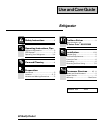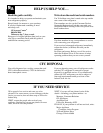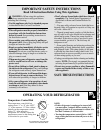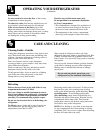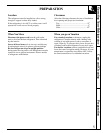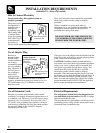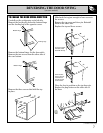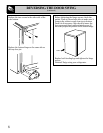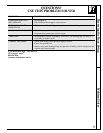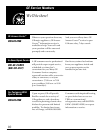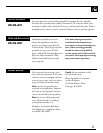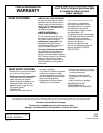
4
OPERATING YOUR REFRIGERATOR
(continued)
Ice Service
Ice trays need to be set on the floor of the ice tray
compartment to freeze properly.
To release ice cubes, hold the tray upside down over
an ice bucket or bowl and twist tray at both ends.
If the ice tray freezes to the floor, pour a little
lukewarm water around it to loosen it. Do not use
boiling water which can damage plastic parts, or sharp
metal objects such as a knife or screwdriver which
can damage the cooling system tubing.
Wash ice trays in lukewarm water only.
Do not put them in an automatic dishwasher.
Ice Tray Compartment
• This compartment is designed for production of
ice cubes and short-term storage (a few days at
the most) of some commercial-frozen foods.
• The temperature in the ice tray compartment
doesn’t get cold enough to freeze food safely.
CARE AND CLEANING
Cleaning Inside—Outside
Unplug the refrigerator and remove food, shelves and
trays. Wash inside with warm water and baking soda
solution—about two tablespoons of baking soda to a
quart of water. Then rinse and dry.
Don’t use cleansers such as soaps, detergents,
scouring powder or spray cleaners—they may cause
odors inside the refrigerator.
Wash ice cube trays, drip tray and shelves in mild
detergent solution and dry with a soft cloth.
To help prevent odors, leave an open box of baking
soda in the rear of the refrigerator, on the shelf.
Change the box every three months.
Wipe outside of refrigerator with a soft cloth
dampened with soapy water or Appliance Polish Wax
Cleaner, available from GE Appliance Service and
Parts Centers. Use only mild, soapy water to clean the
door gasket.
Never use acids, chemical thinner, gasoline, benzine
or the like for cleaning any part of the refrigerator.
Boiling water or benzine may deform or damage
plastic parts.
Do not wash any plastic parts from your
refrigerator in your automatic dishwasher.
Defrosting
Defrost whenever frost on the wall of the ice tray
compartment becomes 1/4″ thick.
Never use a sharp or metallic instrument to remove
frost as it may damage the cooling coils. (A punctured
cooling coil will cause serious problems and void the
warranty.) We recommend using a plastic scraper.
Do not use any electrical device in defrosting your
refrigerator.
To defrost, remove foods and ice trays from the ice
tray compartment, put drip tray in place, and set
temperature control dial at “OFF”.
Defrosting usually takes a few hours. To defrost faster,
keep the door open. Also, pouring warm (not hot)
water on the frosted part may speed defrosting. Do not
use boiling water—it may damage plastic parts.
After defrosting, empty water from the drip tray.
Wash the drip tray in warm water. Wipe the ice tray
compartment with a damp cloth. Then turn the
temperature control to the desired setting and return
food and ice trays to the refrigerator.
NOTE: If ice buildup is very thick, it may keep the
ice tray compartment door from opening or closing
completely. Don’t try to force it open; after defrosting,
the door will open and close easily.



